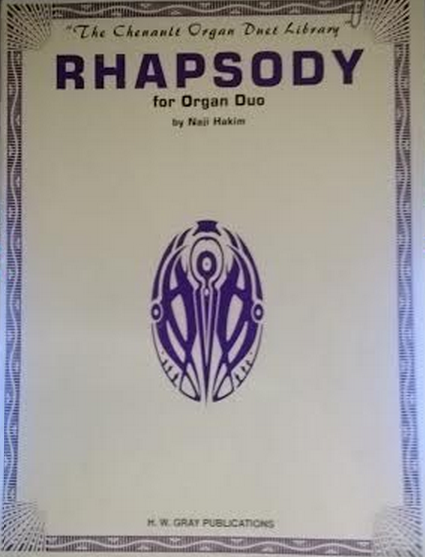My friend, Rhonda Edgington, has invited me to join her in playing a duet on her Advent organ recital. The piece is “Rhapsody”” by Naji Hakim. I have been working on learning my part. Yesterday we went through it together for a second time. I felt pretty good about how I did when playing with this talented musician who has come rather recently onto the Holland Michigan music scene (such as it is). I have been systematically practicing this piece in the hopes that I will play well on Rhonda’s recital. It’s been a fun discipline to try to adapt my tempos and interpretation to hers. I think I have gotten a little comfortable with my own ideas. It’s been a while since I’ve worried too much about playing things in a quick tempo. Yesterday morning before working with her, I sat at my organ bench and took a passage (a page or two actually) and did the traditional metronome approach to learn a faster tempo. By that I mean, one starts out at a comfortable speed regulated by “mister metronome.” Then one click at a time uses the metronome to very slowly increase the tempo. If one knows the music, this can work. I have done this a few times with some of the passages in “Fantasy.” It has paid off pretty well and the sections are pretty solid. Fun stuff. Thanks, Rhonda!

After that I went over to the library for my first visit to the new music section at the Van Wylen Hope College main library.

They moved it from its location in the music building recently to a much more spacious setting on the second floor of the main college library. I had some books I mentioned yesterday in mind to check out and examine more thoroughly. The only thing I really find myself missing about being physically in a library or a bookstore is the random contextual find.
Glancing over the shelves where the books I was looking for were located it was easy to see the newer spines. I pulled out several and found some more recent work in the areas I’m thinking about.

I see scholarship as an ongoing conversation. Since I pay attention to footnotes, I am always interested in the larger conversation of any book I am reading. I realize that the footnote is frozen at a certain point in the conversation, but it can also help a reader move closer to the present scholarship.

So for instance, I was reading in MacCulloch’s Christianity the First Three Thousand Years (originally published in 2009). A footnote in it led me to a collection of essays on Byzantine liturgy and music. A footnote in an article there opened up some scholarly discussion in the form of books and essays about the ontology of music. This discussion took place largely after I graduated from grad school. Running down those books and authors, I find other more recent works by them which updates the discussion even further.

I know this stuff can seem arcane to the disinterested. But I am struck again and again about the pragmatic things I learn in the course of this kind of curiosity detective work. For example, this morning I found myself rummaging around trying to find my copy of Chopin’s Bb minor piano sonata. I wanted to correct an error in all modern editions I had just read in Charles Rosen’s essay “The Frontiers of Nonsense.” I had found this essay in a randomly chosen book by this recently deceased pianist and scholar near one of the other books I was looking for yesterday. In it besides the marvelous ideas that are always present in his prose, he mentioned that the repeat sign in the first movement is in the wrong place. Couldn’t find my copy, but you get the idea.

No, thank YOU!
And, look on your back porch, if you didn’t see it already, to find your Bach Clavieruebung…